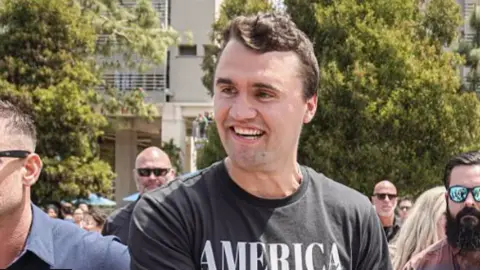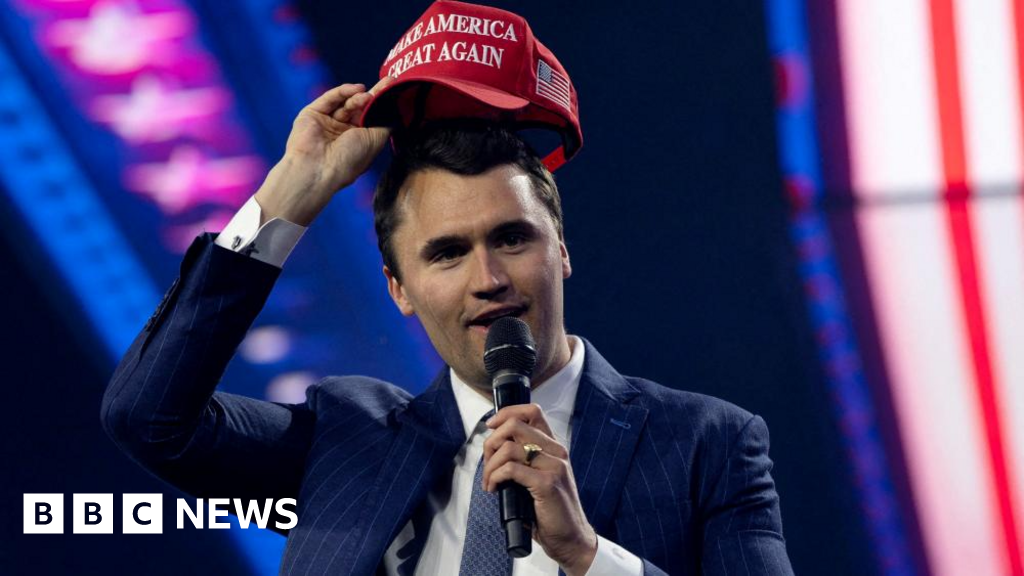Jude Sheerin and Ana FaguyWashington DC
Charlie Kirk was one of the highest profile conservative activists and media personalities in the US and a trusted ally of President Donald Trump.
Kirk, 31, who was shot dead while hosting a college event in what police are calling a targeted shooting, was known for holding open-air debates to challenge youth perspectives.
Turning Point USA, the organisation he founded at age 18 – now expanded to hundreds of colleges – aimed at spreading conservative ideals at liberal-leaning US colleges.
The event on Wednesday at Utah Valley University where he was gunned down was the kick-off of a multi-campus Turning Point tour, during which attendees were invited to debate Kirk about issues like transgender identity, climate change, faith and family values.
 Reuters
ReutersPresident Donald Trump announced Kirk’s stunning death on Wednesday, paying tribute: “The Great, and even Legendary, Charlie Kirk, is dead. No one understood or had the Heart of the Youth in the United States of America better than Charlie.”
For years, the president and his aides valued Kirk’s political antenna for the grassroots aspect of the MAGA movement. Last year, Donald Trump gave a speech at a Turning Point conference in Arizona, returning the favor for Kirk speaking at Republican conventions in 2020 and 2024.
At the beginning of Kirk’s podcast, a clip of Trump himself plays: “I want to thank Charlie, he’s an incredible guy, his spirit, his love of this country, he’s done an amazing job building one of the most powerful youth organisations ever created.”
He is referring to Turning Point, a large part of Kirk’s legacy. Kirk founded the non-profit organization after President Barack Obama was re-elected in 2012.
Its mission, aimed at young people, is to organize students to “promote the principles of fiscal responsibility, free markets, and limited government”. It now has chapters in more than 850 colleges.
Turning Point played a key role in the get-out-the-vote effort for Trump and other Republican candidates in last year’s election. The millennial was credited widely with helping to register tens of thousands of new voters and flipping Arizona for Trump.
The relationship grew after Trump’s victory, with Kirk attending Trump’s inauguration in January in Washington DC, and becoming a regular visitor at the White House during both Trump terms in office.
Earlier this year, he travelled with Trump’s son, Donald Trump Jr, to Greenland, as the then-incoming president was arguing that the US should own the Arctic territory.
The son of an architect who grew up in the well-to-do Chicago suburb of Prospect Heights, Kirk attended a community college near Chicago before dropping out to devote himself to political activism.
He also applied unsuccessfully for West Point, the elite US military academy and often referred tongue-in-cheek to his lack of a college degree when engaging in debates with students and academics on esoteric topics such as post-modernism.
In fact, he was an avid public speaker, touring the country speaking at Republican events, many popular with members of the ultra-conservative Tea Party movement, and his daily conservative talk radio show had millions of followers on social media, CBS News reported.
 Getty Images
Getty ImagesKirk addressed the Oxford Union earlier this year, and in 2020, wrote a best-seller, The Maga Doctrine, a reference to Trump’s Make America Great campaign.
But his evangelical Christianity and his family – he married a former Miss Arizona, with whom he had two children – were front and centre in his politics, and he was seen as both the future of conservative activism – as well as a highly polarising figure.
 Reuters
ReutersGun control was among the numerous political and social issues he discussed at events and on podcasts. A few months ago, Kirk said: “It’s worth it to have a cost of, unfortunately, some gun deaths every single year so that we can have the Second Amendment”.
He spread anti-transgender views and skepticism over the Covid-19 pandemic, and also publicly promoted the false claim that the 2020 election was stolen from Trump.
But in reacting to the fatal shooting, some stressed that Kirk appreciated and encouraged debate over different ideas.
“His entire project was built on reaching across the divide and using speech, not violence, to address and resolve the issues!” William Wolfe, executive director of the Center for Baptist Leadership, posted on X.
 Getty Images
Getty Images

